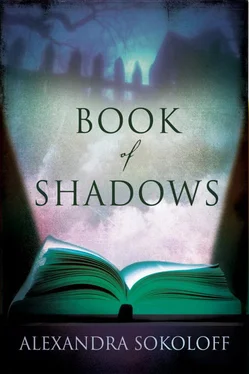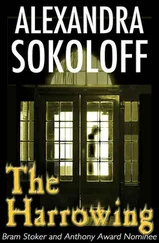No one in the doorway.
But there was another dark smear centered above the door frame, and something in the center of the smear: a small blackish rounded lump that appeared to be nailed to the wall. Garrett turned to one of the techs beside him and took his light from him. He shined the light up the stairs, focusing on the lump.
For a moment Garrett couldn’t make it out, then his stomach turned over. Beside him the tech squinted up toward the pool of light, and suddenly sucked in a breath. “Is that… Jesus.”
It was a human eye nailed to the wall.
The photos of the crime scene were strewn all over the conference table at Schroeder, and they were as bad as in Garrett’s memory: the triangle in the floor, with the stained pedestals; the sigils painted on the walls; the gruesome Hand of Glory; the eye nailed above the door.
“What the hell happened down there?” Malloy raged as he paced the room. It was a quiet, tight-lipped rage, which made it all the more ominous. Frazer sat in an armchair in a corner of the room, silent, watching.
Garrett was shaky from anxiety and exhaustion, and he had to fight to keep his voice steady. “Lingg thinks the perp mixed a psychotropic with DMSO for—”
“What the hell were you doing there to begin with?” Malloy’s voice ran over him.
Garrett breathed in to keep his face from betraying his loathing of the man. “We got a partial plate from the homeless man who witnessed Amber Bright’s abduction. The plate matched a vehicle registered to John McKenna, a foreman from the Pine Street landfill where Erin Carmody’s body was dumped. McKenna stopped coming to work on June fourteenth without giving notice and with no further communication with his employers.” He paused, and was grateful that for the moment Malloy was silent, simply processing.
“The eye nailed to the wall of the cellar is human, and this is a severed human hand.” Garrett pointed to the photo of the Hand of Glory with its burned-down black candle. “Officers are searching the scene for other human remains, but my guess is that we’re not going to find them.” He pointed to one of the photos of a stone pedestal. “Lingg confirmed that this is blood on each of the three altars.” Malloy recoiled at his use of the word.
“The lab is running the DNA to check against Erin Carmody’s and Amber Bright’s, but it’s going to take days for the results.” Garrett took a breath. “My guess is that the killer was using their heads on these altars.”
Malloy looked even more affronted. “ Using the heads?”
“I believe McKenna was taking his victims’ heads to use in a black magic practice called necromancy—”
“McKenna?” The outrage was plain in the lieutenant’s voice.
“Yes, McKenna,” Garrett said. “I believe we should be shifting our investigative focus to him. It’s possible that McKenna is dead, a third victim, but he doesn’t fit the victim profile: two teenage girls and a middle-aged man? It doesn’t add up. We’ll need HazMat to okay us to go back in and process this scene, but in the meantime, I’m going to be delving into McKenna’s personal life and employment history, and tracking him down from his last known whereabouts—”
“Detective Garrett.” Malloy’s voice was sharp, and he held up a hand to stop him. Garrett fell silent. The lieutenant’s eyes bored into his face. “I understand that you claimed that there were human heads in the cellar. Yet no heads have been found at the scene.”
Garrett stiffened, sensing danger. He glanced toward Frazer, whose face was a blank. After a moment, Garrett answered carefully.
“It was very dark. I was attacked only seconds later. A lot was happening—”
Malloy stared him down. “Dr. Frazer is of the opinion that the psychotropics could have been airborne as well as absorbable by touch-contact.”
Garrett didn’t know where this was going, so he waited.
“I’m sending you for a full physical exam and blood tests,” Malloy said.
Every warning bell in Garrett’s nervous system suddenly went off. “I don’t think that’s necessary—” he began.
“I do,” Malloy cut through. “You’re to report to Dr. Ramos at Mass General in one hour for a full tox workup.”
Garrett stormed out of the conference room, cursing Malloy in his head, but in the end he stifled his rage and went to the hospital anyway, because that was where Landauer was. Once the initial fury had worn off he was operating in a daze, and the everyday chaos of Mass General, the milling families, the crying children and striding groups of medical personnel—wasn’t helping him focus. He headed for the ER, and though he was not family, a sympathetic nurse who understood about cops and their partners told him what they knew: Landauer was unconscious, in critical condition. The chemicals in his system were atropine and a variety of other toxins that should have been lethal; it was only because Landauer was so big that he was still alive.
They weren’t letting anyone see him yet, but the nurse promised to call Garrett as soon as they knew more.
Garrett thanked her dully. He turned away from the counter and felt grief and fury wash through him.
Landauer’s words—some of the last sane words he had spoken—kept going through Garrett’s head. I don’t know what she is, but she mighta saved my life.
Or ended it, Garrett thought grimly.
Now it was Tanith’s voice he heard:
“Do you know I could have booby-trapped the house, put a spell on the door against intruders, bound the book with toxins… so if you so much as touched a page you would die a slow death, untraceable—”
And what if she did? What if that was exactly what she did?
A rage began to build, a blind fury at Tanith Cabarrus.
This latest crime scene threw the media into a feeding frenzy, especially since no one at the department was talking. On his way back in to Schroeder, Garrett dodged a mob of reporters and bolted up the DNA stairs.
He knew there was something wrong the moment he stepped through the open door of Malloy’s office. Detectives Palmer and Morelli stood in the room in front of the lieutenant’s desk, and the sight gave Garrett’s stomach an uneasy lurch. Granted, the case had suddenly expanded, and with Landauer down Garrett had not been expecting to work the case on his own. But Morelli and Palmer were an ominous sign, especially because Morelli seemed to be in the middle of a verbal report. Garrett stopped in the doorway, watching in disbelief as the older detective spoke. “We’ve put out an APB on McKenna, and a MP report. So far there’s no trace of him. There was no regular mail delivery; he has a post office box that he hasn’t visited since he walked off the job—”
“That’s why McKenna is looking like the prime suspect,” Garrett interrupted, giving Morelli a cold look as he walked into the room. “He disappeared from work without a trace, his basement was being used for rituals, he had access to and knowledge of the landfill where Erin Carmody’s body was dumped. By his stats on his sheet he’s five-eleven, two-thirty, a powerful enough man to have subdued these victims. His car has been identified by a witness to Amber Bright’s abduction—”
Palmer cut in. “A homeless schizophrenic? That ID will never hold up in court.”
Garrett turned on him, barely holding himself back. “Since the two of you have been such good do-bees in my absence, have you found a single witness who has seen McKenna since he disappeared from work? Have you checked his computer for satanic sites?”
Malloy spoke for the detectives. “We’ll be able to get into the house tonight. If you could give me a moment, Detectives…” He glanced at Morelli and Palmer.
Читать дальше












